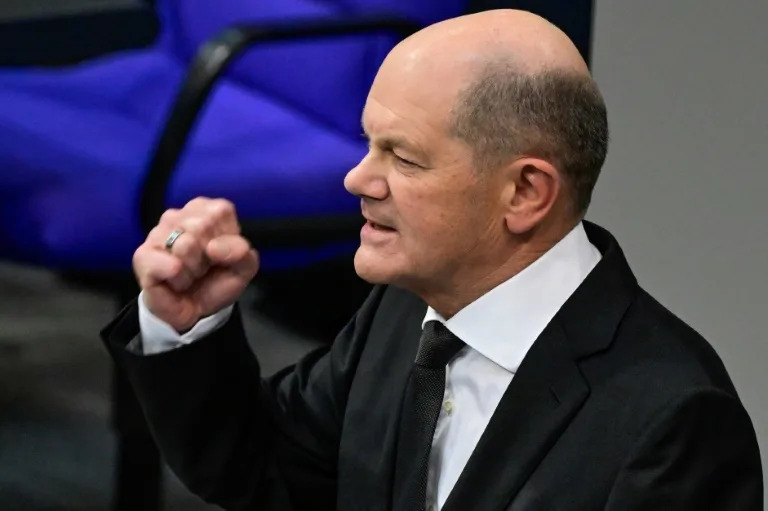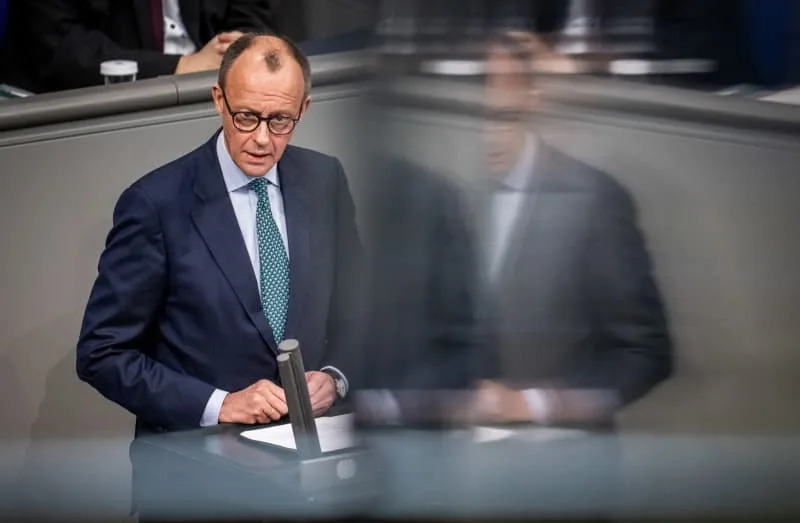German Chancellor Olaf Scholz vowed Wednesday to rally European partners to cobble together support for Ukraine "so huge" that it would weigh on Russian President Vladimir Putin's calculations.
Scholz had ramped up calls for other EU nations to dig deeper for Ukraine.
The pledge by the German leader, once criticised for dragging his feet on arming Kyiv, came with fears growing that support from Ukraine's biggest weapons supplier, the United States, could fall away.
"We will do everything to ensure that the joint contribution from Europe is so huge that Ukraine can build on it and that Putin would not be able to count on our support waning at some point," he told the German parliament ahead of an EU summit aimed at shoring up military support for Kyiv.
In recent weeks, Scholz had ramped up calls for other EU nations to dig deeper for Ukraine.
The EU's foreign policy chief Josep Borrell admitted Wednesday that the EU will supply Ukraine with just over half of the one million artillery shells it promised to send by March.
In a letter published Wednesday in the Financial Times, Scholz, along with four other European leaders, said despite the failure that "we can't just give up on our promise".
"We must renew our resolve and redouble our efforts in order to ensure that we sustain our support for as long as it takes," wrote Scholz, Denmark's Mette Frederiksen, the Czech Republic's Petr Fiala, Estonia's Kaja Kallas and the Netherlands' Mark Rutte.
- 'Life and death' -
As orders placed now would only be delivered next year, the leaders underlined that it was crucial to find ways to accelerate the supplies of promised artillery rounds -- through donation of existing stocks or joint procurement.
"The burden is so great that all states need to do everything they can to support Ukraine -- it must continue to be a collective effort," they wrote, underlining that it was a "question of life and death" for Ukrainian soldiers.
The call dovetailed with Borrell's demand on Wednesday for each of the 27 nations to lay out a detailed picture of the military support they are providing to Kyiv.
Accusations have been levelled that key EU economies such as France, Italy and Spain are not pulling their weight on arming Ukraine.
Ukrainian President Volodymyr Zelensky said Germany must use its economic clout to push others to chip in.
"Germany can manage to consolidate the EU," he said in an interview with public broadcaster ARD on Sunday.
"Many countries have important economic relationships with Germany and their economy is dependent on Germany's decisions because Germany has a strong economy," he said.
Germany has become Ukraine's second biggest armaments supplier after a sputtering start. Much of its contributions like Leopard tanks had been made only after public haranguing from other allies.
Even now, Scholz comes under fire for refusing to provide the long-range Taurus missiles sought by Kyiv.
Yet Zelensky, asked if he was disappointed with Scholz over the refusal, hinted that the picture was more complex than that.
"It's not just about Olaf -- it concerns European leaders and the US," he said, adding that he could not say more.
- 'Hubris' -
Some 50 billion euros ($54 billion) of funding for Ukraine was at stake at Thursday's summit in Brussels, and Hungary has so far blocked the package.
The urgency for EU allies to step up for Kyiv has grown as assistance from the US is held up by domestic political squabbles.
President Joe Biden has made backing Ukraine a priority and US weapons and financial assistance have been crucial in helping the pro-Western country battle against a far larger attacking Russian force.
But Republicans have led a push to halt the effort, refusing to authorise new budget outlays unless Biden's Democrats first agree to sweeping new measures against illegal migration.
With the United States in an election year that could again pit Biden against Donald Trump, Zelensky has warned that a Trump return to the White House would likely bring a "different policy" on the war.
For Scholz, it "would be hubris" to imagine that Germany could shoulder the weight alone without the United States.
"We are only a middle-sized power," he said.
Top German politicians underscore Franco-German leadership in EU
Friedrich Merz, Chairman of the CDU and leader of the CDU/CSU parliamentary group, speaks during the general debate on the budget at the German Bundestag.
Both German Chancellor Olaf Scholz and conservative opposition leader Friedrich Merz underscored the importance of Franco-German leadership for guiding the European Union.
Scholz, speaking in parliament in Berlin on Wednesday, said that he is relying on cooperation with France to overcome global crises that threaten European security and prosperity.
"[French President] Emmanuel Macron and I have agreed - very, very carefully - on how we will react in detail to the possible political developments that we will face in the world," Scholz told German lawmakers.
Scholz suggested that German and French leadership could be particularly important if former US president Donald Trump returns to office after autumn elections in the United States.
Trump has questioned US commitment to the NATO alliance as well as ongoing US military support for Ukraine, stances that have made many European leaders uneasy.
"If the world becomes even more difficult, for example as a result of the possible outcome of the elections in the United States, then the European Union must become all the stronger. And France and Germany must take on that task in order to make that possible," Scholz said.
He described the EU as Germany's "strongest national interest."
Merz, the leader of the centre-right CDU/CSU opposition bloc, largely echoed those remarks. He urged Scholz to take on a larger leadership role in the EU alongside France.
Germany must take President Emmanuel Macron's outstretched hand and jointly "develop new initiatives to demonstrate Europe's ability to act independently," Merz said.
Franco-German cooperation should also focus on closer military cooperation and a path toward a common European defence policy, Merz said, especially in light of Trump's potential return to the White House.
Merz also urged Scholz to revive the three-way partnership between Germany, France and Poland - a relationship once dubbed the "Weimar Triangle" - following the recent election of Polish Prime Minister Donald Tusk's more EU-oriented government.

Scholz denounces conservative opposition leader in budget debate
German Chancellor Olaf Scholz sharply attacked conservative opposition leader Friedrich Merz during a debate in parliament on Wednesday, accusing him of lacking a vision for Germany's future.
"What does your political programme actually have to do with the future of Germany? Nothing, that's the answer," Scholz, a centre-left Social Democrat (SPD), said on Wednesday during the debate over his government's budget proposal.
"How can you want to gamble away Germany's future the way you are doing? Economic expertise: zero. That is the truth. No prospects for Germany. No industrial perspective. No prospects for jobs," Scholz shouted at Merz, who leads the conservative CDU/CSU bloc.
Scholz argued that his three-party coalition government is still working to clean up the mess left by former CDU chancellor Angela Merkel's government.
"And a great deal has been left undone," added Scholz. "For many, many, many years, there was failure to set a decisive course for Germany to have an industrial future."
He contended that the CDU/CSU bloc bears responsibility for slow progress on renewable energy in Germany after having fought intensely for years to undermine projects like expanding Germany's energy grid.
The chancellor said that work has now finally been undertaken by Scholz's coalition government of Social Democrats, Greens and liberal Free Democrats (FDP), which took office in December 2021.
Merz, a frequent critic of Scholz's government, again attacked their policies in the debate on Wednesday. He said frustration with Scholz's failure to solve the country's problems is partly responsible for rising support for the far-right Alternative for Germany (AfD).
Merz also rejected Scholz's repeated calls for cooperation from the conservative opposition, contending that experience over the past two years has shown Scholz's government is uninterested in actual compromise.
"Please spare yourself and us your calls for cooperation in future," Merz said on Wednesday in parliament. "These calls are nothing more than pure political rhetoric."




